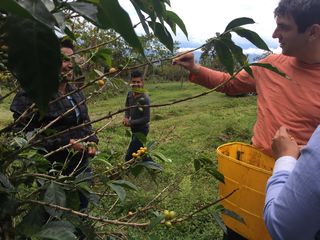Gratitude
Adventures in Gratitude
Author A.J. Jacobs explores the benefits of being thankful.
Posted November 13, 2018

Author A.J. Jacobs is naturally a little grumpy, a little irritated. He wanted to boost his feelings of happiness and appreciation, so he embarked on a “gratitude journey.” He selected one item that was important to him—his morning cup of coffee—and decided to thank at least 1,000 people who contributed to its creation. His new book, Thanks a Thousand: A Gratitude Journey, documents his experience thanking farmers, steelworkers, designers, and hundreds of others as he explores the many benefits of gratitude.
You describe yourself as closer to Larry David than Mr. Rogers. Why did you want to shift your mindset to be more grateful?
I’m more on the Larry David end of the scale, and I think a lot of other people are, too, because we’re born with a negative bias. That served us well as cave people but isn’t a great way to go through life. I knew that gratitude was one of the keys to happiness, if not the most important key. A mountain of research shows that gratitude can make people happier, more generous, sleep better, eat healthier, and get sick less. I knew intellectually that I should be more grateful, but the trick is how to actually make yourself more grateful. That’s why I thought I should go on a trail of gratitude—walk the walk—and see if I could bring out my inner Mr. Rogers and turn the volume down on my inner Larry David.
Why did you choose coffee as a starting point?
First, I see it as a need, right there on Maslow’s hierarchy of needs with food and shelter. Second, I thought it was an appropriate choice because it takes thousands of people to make it and because it’s had a huge impact on history and on our current world. Two billion cups of coffee are drunk every day. Coffee causes a lot of joy, but if you look at the supply chain, it also causes pain and suffering.
Let’s talk about a few stops on your journey. What did you learn from your conversation with your barista?
Chung was the first person I thanked. She explained that it is not an easy job, because you’re encountering people in a very dangerous state: pre-caffeination. She said what bothers her the most is that most people don’t treat her like a human being but like a vending machine. They thrust out their credit card without looking up from their phone. I’ve done that before, so I made a pledge—and I’m not expecting the Nobel committee to come knock on my door—but I made a pledge that I look the person in the eye in every interaction, to remind myself that they’re human and that I’m human. We’re built for face-to-face connection, so it makes both people happier.
What did you take away from speaking with people who work at the reservoir?
Coffee is 98.8 percent water and 1.2 percent coffee powder. So I figured I should thank the people who make New York’s water possible—and there are thousands. I went up to the reservoir system, which is enormously, mind-bogglingly big. It’s almost twice the size of Rhode Island. There used to be towns, churches, and shops where the reservoir is now, but New York City was a huge metropolis and we needed the water, so we flooded their towns. That’s not easy and some people have not forgotten. One of the people I met was Mark Dubois, who lived there and worked for the reservoir system. His grandfather lived there before there were reservoirs, and the house where his grandfather lived is now under 50 feet of water. Many years ago, there was a drought, and he was able to walk out to where his grandfather’s house used to be and see the remains of the structure. He said it was as close to a sacred experience as he could have had, a connection through the generations. The lesson I took was that things don’t come for free and that other people have to sacrifice.
Your last stop was a farm in Colombia that grows coffee beans. How was that experience?
We live in modern society where what we consume is so far from where it originates, so it was fascinating and gave me a sense of connection to where my coffee comes from. I saw coffee beans growing inside these little red fruits on a tree on the side of a mountain in Colombia, and I knew that in six or seven months, one of those beans would have traveled a thousand miles to be in my cup. It was interesting to meet the farmers. They were a little baffled at the beginning, but once I explained my project, one of their reactions was to say all of the things they were thankful for, like the equipment they use from all around the world and the people who buy their coffee. I loved that.
How did the process of thanking people address the more harmful aspects of the supply chain?
Thanking the thousands of people who make it possible is one way to help, but another is that it forced me to become aware of every step in the chain. That’s one thing about gratitude that I think is underappreciated—that it sparks action, to be more generous. Studies show that when people are feeling more grateful, they’re more willing to help others and pay it forward. I think I became a little bit of a better human being. I’m not Gandhi or Mother Theresa, but I became like 10 percent better at thinking about the world instead of myself.
It’s pretty unusual to call people and thank them out of the blue. How did you make sure your gratitude came across as authentic?
A lot of times we are reluctant to thank people because we think it’s going to be awkward. A recent study found that we overestimate the awkwardness and underestimate the meaningfulness of saying thanks. I definitely found that. Some people were skeptical when I said thanks. They asked what I was selling or if it was a pyramid scheme. But the vast majority were really touched. I think we overestimate how disingenuous gratitude appears to be—people are so starved for gratitude.
I also think it’s helpful to be as specific as possible. I teach my kids that when they write thank you notes, they should paint a picture of how what the person did changed their life. Instead of saying, “Thanks for growing coffee beans,” you say, “I just want to let you know that when I drink the coffee from your beans every morning, it gives me the energy and confidence to write my books.” Also, acknowledge details about what they do. For example, “You’re out here in the reservoir and I can’t believe all the work you do and all the challenges you face with hurricanes and with germs, so I really appreciate it.” Being specific makes it more meaningful.
What is the connection for you between gratitude and the knowledge that we only have so much time on Earth? How can gratitude influence the way we spend it?
For many years I’ve been fascinated by memento mori, the reminders of death that many civilizations have had. One of my favorites is that when a Roman general would come back from conquering a new land, he would ride in his chariot on a victory parade, but a servant would be behind him whispering, “you are just mortal.” The idea was don’t get too big for your britches—or your toga. For me, it’s a sense of humility, that our time here is fleeting so we should relish the good things in life. When you’re reminded of how fleeting life is, you can have two reactions. One is to give up and curl up and eat Cheetos. The other is to make the most of it, be a good citizen, and make life better for other people. Some people might find it depressing, but I find it empowering.
Do you feel that the benefits of gratitude materialized after your journey?
It’s helped me to focus on the hundreds of things that go right every day instead of the three or four that go wrong, which is such a hard skill. I was thinking of the phrases “glass half full” and “glass half empty.” I’ve decided that’s the wrong way to look at it. You need to step back further and be amazed that there’s water in that cup at all. The fact that we can turn the tap on and have drinkable water is unbelievable. It hasn’t been available to 99.9 percent of humans throughout history, and it’s still not available in many parts of the world.
Do those thoughts come naturally or is it an active process?
Gratitude is a practice, and you have to force yourself to do it, since our default mode is ungrateful.
What’s your advice to readers who are interested in becoming more grateful?
First, make an effort to remember the good things that happen and collect them in a mental bank. If we get 99 compliments and one insult, our brains are tuned to remember the insult. So step back and say, “I’m going to remember that compliment. I’m going to file it away, so that if I get negative feedback I’m going to be able to balance it.” Second, do a trail of gratitude in a smaller way. It could be as easy as making eye contact with the person at the checkout counter or letting your local pizza place know that you like their logo. I guarantee it will make their day.
In addition to learning about gratitude, I’m sure you learned a lot about coffee. What’s the most surprising fact about coffee that you didn’t know before?
I now have a theory that the North would not have won the Civil War without coffee. The Union troops had real coffee but because of a naval blockade, the Confederate troops had to make do with substitute coffee made of corn and chicories, which was not caffeinated. I don’t have any scientific studies to back this up. But if I was a soldier, I’d want my coffee!




